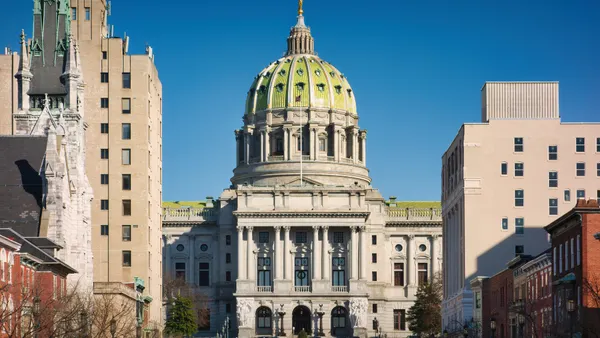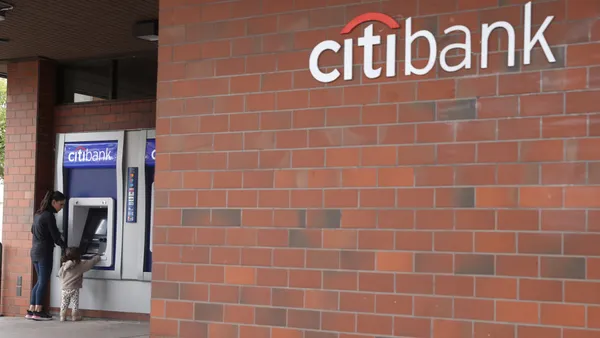Dive Brief:
- The Federal Reserve and the Office of the Comptroller of the Currency will hold a virtual meeting July 19 to allow public comment on Capital One’s proposed $35.3 billion acquisition of Discover, the regulators said in a press release Tuesday.
- The agencies also extended until July 24 the period through which public comment can be submitted. While the July meeting will be open to the public, people seeking to present at it will need to register by June 28 through an online registration website, the regulators said.
- President Joe Biden in 2021 ordered “more robust scrutiny” of bank mergers, and the Fed and OCC have typically held public hearings on deals above a certain threshold. The regulators convened a trio of such meetings in 2022 on proposed acquisitions by U.S. Bank, BMO and TD. Each transaction was for $8 billion or more, and the first two were ultimately approved.
Dive Insight:
The Capital One-Discover tie-up, at $35.3 billion, far surpasses the threshold for which regulators in past years have held public hearings.
And since those 2022 meetings, a number of regulators have taken steps to keep a closer eye on banking combinations.
The Federal Deposit Insurance Corp. announced in March it would more closely scrutinize mergers that create banks with more than $100 billion in assets, but the proposal was approved by a party-line vote, with three Democrats in favor and two Republicans opposed.
The FDIC said it would ramp up its focus on anti-money laundering and financial stability concerns for institutions with $100 billion in assets or more. Banks with $50 billion or more, meanwhile, would see greater scrutiny on the impact of a merger on local communities.
The OCC’s acting chief, Michael Hsu, in January proposed doing away with expedited bank merger procedures that could allow some deals to gain approval without proper scrutiny.
Bank merger applications exist along a “spectrum,” Hsu said.
“They are neither all good, nor all bad,” he said. “By faithfully applying on a case-by-case basis the Bank Merger Act statutory factors, the diversity and dynamism of the U.S. banking system can be maintained and strengthened.
“Healthy bank mergers — i.e., those that benefit communities, support bank resilience and financial stability, and enhance competition — should be approved,” he added. “Merger applications that would diminish competition, hurt communities, or present systemic risks should be withdrawn or rejected.”
The OCC’s policy drew backlash in a comment letter from PNC CEO Bill Demchak. Proposed changes to the agency’s bank merger application process “would only serve to further accelerate the unhealthy consolidation at the very top of the banking industry by allowing the biggest banking organizations to continue to grow unchecked,” Demchak wrote in April.
Issues to be considered as part of the Capital One-Discover meeting include the effects of the merger on the communities that the banks serve; competition in the markets they serve; the impact of the merger on the U.S. financial system; and the companies’ effectiveness in fighting fraud, the Fed and OCC said Tuesday in the meeting notice.
“We welcome the opportunity to further discuss how a combined Capital One and Discover will jumpstart competition in the payment network space, and build on our customer-first legacy — delivering positive benefits to consumers, merchants, and our communities,” Capital One said Wednesday in an emailed statement to Payments Dive.
The Capital One deal was expected, from the beginning, to draw significant antitrust scrutiny.
But, as with the FDIC vote on bank merger policy, some partisan division has emerged among lawmakers.
Some Democrats in Congress immediately called on the federal government to block the merger, saying it would harm consumers and the financial system.
“To protect consumers and financial stability, we urge you to block this merger and strengthen your proposed policy statement to prevent harmful deals in the future,” 13 lawmakers wrote in a Feb. 25 letter to the agencies.
By contrast, one Republican House member has introduced a bill that aims to curtail the amount of time banks wait for a regulatory response on merger applications.
In March, 30 advocacy organizations, including Consumer Reports, U.S. PIRG, the Consumer Federation of America and the National Community Reinvestment Coalition, urged bank regulators and the Department of Justice’s top antitrust official to provide for transparency throughout their review of the proposed acquisition. They also expressed concerns about the transaction, noting in a letter to regulators that it would increase the banks’ “market power.”
— Dan Ennis contributed to this report.














